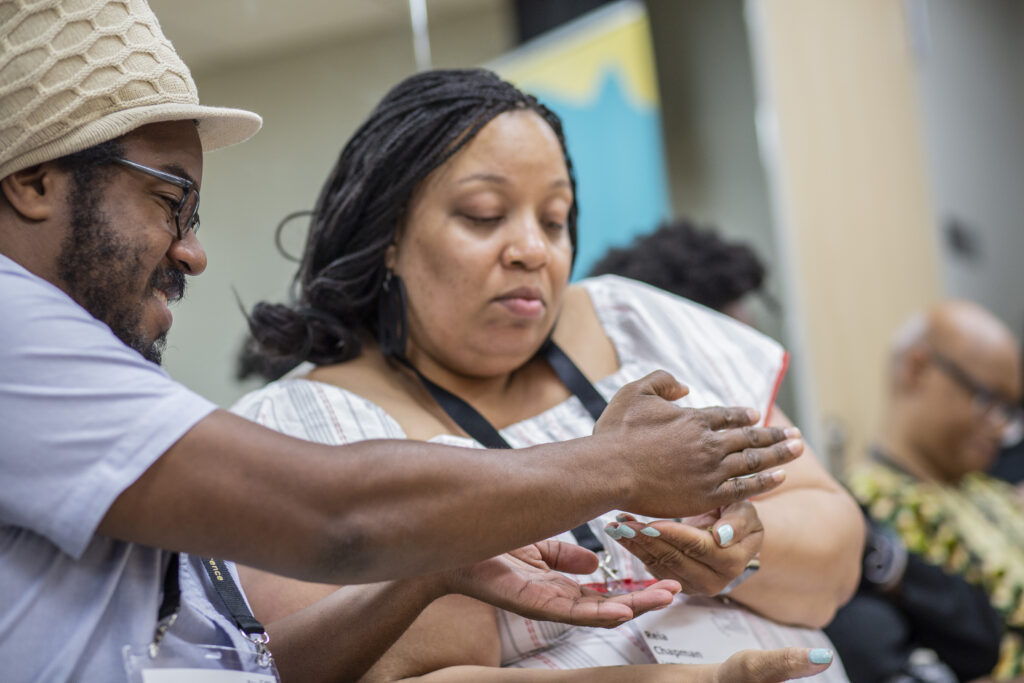How To Virtual AMC
 Virtual Accessibility
Virtual Accessibility

We believe interdependence and mutual care are crucial for our collective liberation. We are exploring how to make the virtual AMC experience as accessible as possible, while recognizing that access needs are ever-changing.
Virtual Accessibility
Accessibility at AMC2022 will include:
- ASL/VRI interpretation, CART, and simultaneous Spanish-English interpretation will be provided for the Opening & Closing Ceremonies & Plenaries
- ASL/VRI interpretation, CART, and Spanish-English interpretation will be available upon request for Session Blocks
- Please note: for Session Blocks automated captioning will be used unless CART services are requested for the particular session
- Session blocks with ASL/VRI interpretation, CART, & Spanish-English interpretation already requested by session facilitators will be indicated in the schedule and be updated accordingly
- Once you have registered for the conference, fill out the AMC Access Service Request form to request accommodations for sessions.
- Additional language interpretation can be provided if request before June 10th
- Pre-recorded media will be captioned in English when appropriate
- AMC will work with speakers and facilitators and share best practices to create accessible presentations and sessions
How you can support Disability Justice and Language Justice at the AMC:
At the AMC we encourage people to engage with their whole selves, not just with one part of their identity. Making it possible for everyone to do so is a collective effort.
We are all managing different levels of pain, energy and screen-fatigue. People will also be participating from all different time zones and in multiple languages. There will be people with a variety of disabilities, from vision to hearing to neurodiversity and more. Many sessions and events will have ASL and language interpreters, and captioning.
Here are some tips for how we can all support disability justice and language justice at the AMC:
Throughout the conference
- Avoid ableist and other harmful language – learn more here
- When you speak, announce your name, share your pronouns, and describe yourself if your camera is turned on- some participants may be blind or have low vision.
- Recognize that some people may be caring for children or for another person while also attending the conference, which may result in background noises or the need to suddenly step away.
- Speak loudly, clearly and at a moderate pace so interpreters can hear you
- Be patient and ensure that only one person speaks at a time
- Understand that language is sensitive and everyone has their own preferences
- Recognize the difference between identity-first and person-first language, especially when discussing disability. Note: many activists from the disability community prefer using identity-first language – learn more here.
During Sessions
- If you are comfortable, please use your camera, especially if you will be speaking as body language, facial expressions, and lip reading are important to many people
- Edit your name to include your pronouns by selecting “participants” -> find yourself -> select “more” -> select “rename”
- Be patient with the tech if you notice any issues with folk accessing interpretation or the interpretation tech isn’t working, please let the Radical Hospitality Host/tech support know
- Understand that there is a wide variety of ways that people communicate, process information, and express themselves. If you mention something verbally, follow it up with a written message
Tech notes for accessibility and language interpretation
- Unless you understand both English and any other languages present in the session, you may have to pick a channel to listen and participate in your language of choice
- To “pin” a video for ASL interpretation purposes – click on the three dots near your name and select “pin video”
- Live captioning may be available in a pop-up, external browser window depending on the type of captioning being used for each session – check with your facilitator and Radical Hospitality Host
- Understand that interpretation is for everyone. In a space where multiple languages are being used, interpretation is equally as important for participants using dominant languages as for folks who express themselves in other languages.
In Person Accessibility Guide
Check out the in person accessibility guide!





